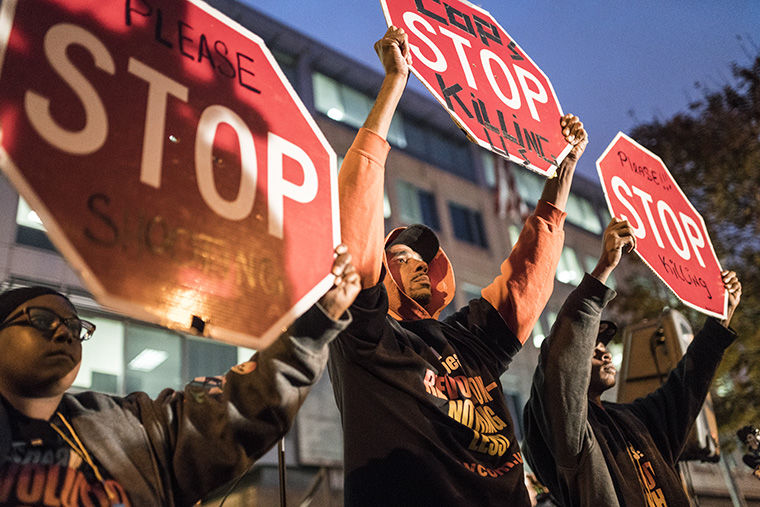Two years after Laquan: Chicago continues demands for accountability, resignations
Protesters calling for police reform gathered Oct. 20 outside CPD Headquarters on the two-year anniversary of the death of Laquan McDonald, who was killed by a CPD officer.
October 24, 2016
Demands for police accountability and political reform continue as protesters and activists honored the two-year anniversary of Laquan McDonald’s death.
The event, held outside of the Chicago Police Department Headquarters at 3510 S. Michigan Ave., was organized by activist William Calloway to “demand the termination of all involved with falsifying police reports in efforts of covering up his death,” as stated on its Facebook page.
On Oct. 20, 2014, 17-year-old McDonald was shot 16 times near 41st Street and Pulaski Road by Chicago police officer Jason Van Dyke. After a $5 million settlement to McDonald’s family in April 2015, Cook County Judge Franklin Valderrama ordered the city to release the police dash-cam video by Nov. 24. Protests followed, leading to the firing of former CPD Superintendent Garry McCarthy, amid chants of “16 shots” from Black Lives Matter activists.
At the gathering, numerous citizens grieving for family members killed by CPD officers spoke on stage. Gwendolyn Moore, mother of Jamaal Moore, who was unarmed while killed by a Chicago police officer in December 2012, addressed the crowd.
Moore said she came to support the McDonald family and thinks police officers’ mindsets about using force have to change.
“Use of excessive force is not always warranted,” she said.
In an Oct. 20 press release, Mayor Rahm Emanuel said the incident was a “wake-up call” for the city and McDonald “unnecessarily” lost his life.
“We will continue working together across the city to build a brighter future by restoring trust between residents and our officers,” Emanuel stated.
Moore said she does not think the mayor’s comments are genuine, adding that if he had that mindset before, the McDonald incident would not have happened.
Tio Hardiman, executive director for CeaseFire Violence Interrupters, said if the dash-cam footage was never released, Emanuel would have taken the killing “to the grave.”
Emanuel had wanted to hide McDonald’s murder to save his reelection last year and only initiated police accountability reforms because he was forced to, according to Hardiman.
Hardiman called the actions on the McDonald incident a “code of silence 2.0,” and said the mayor was not “genuine and sincere” about changes made to the system, such as the Civilian Office of Police Accountability.
Reid Gordon, a pastoral ministry student at Trinity Evangelical Divinity School in Deerfield, said he attended the anniversary event to speak out against issues including corruption in Chicago.
“The gospel of Jesus Christ compels me to take a stand for those who are being trampled by the powerful,” Gordon said.
Gordon said he thinks Van Dyke’s actions went further than needed, calling it “a gross miscarriage of justice.”
Pastor of Kingdom Life Center Church Kevin Jones worked closely with William Calloway in creating House Bill 6616, The Laquan McDonald Act, filed by State Rep. Kenneth Dunkin. Jones said the goal of the bill is to hold those in power accountable.
“We have asked Emanuel to step down, but obviously, that is not what he is going to do,” Jones said. “[The Laquan McDonald Act] would help that process go faster through recall legislation.”
Moore, a supporter of the Laquan McDonald Act, said she would like to see Emanuel step down because he failed to serve the Chicago community.
“Rahm Emanuel needs to be held accountable for the actions he has chosen not to take,” Moore said.
Installing the Civilian Police Accountability Council is needed in order to have true change, according to Hardiman, who shared Moore’s sentiments.
“[A police review authority] should not be appointed by the mayor,”he added. “To make a long story short, [Emanuel] needs to go.”








